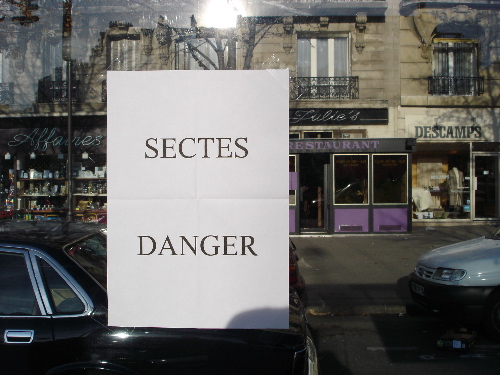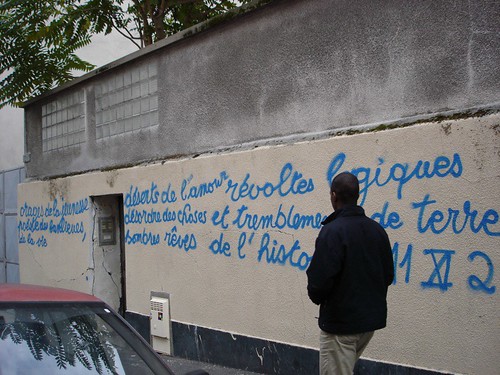20/12/05
Bienvenu à mon blog de Charonne
It’s been more than two weeks now, since I’ve moved house. This move has made me realise that I in fact lived in a village before, and now I seem to have moved downtown. In downtown Charonne, I’m not recognised by the baker the second time I enter his shop, and the same faces don’t surround me on the street every day. In our little neighbourhood in Ménilmontant I saw familiar faces all the time, and even a shy person like me got to know the local merchants in not much time. As I think about how quickly I got a sense of the village-like place I moved from, I realise that I’m not able to give a good description of my new quarter yet, despite having lived here for a while.
19/12/05
Meetings, conferences, debates, demonstrations, concerts…
One month ago I had problems leaving the house in order not to lose out on some heated debate or in-depth reportage covering the riots on TV or radio. Now the debates have entered the public spaces in Paris, and on some days they’re so prolific that if I choose one, I lose out on others. For instance last Thursday there was a demonstration against l’état d’urgence sociale (the social state of emergency), supported by a range of political organisations, a few labour unions and at least one political party (Les Verts – The Greens). As such street demonstrations pop up every second day in this city, that opportunity was the first to be eliminated from my range of choice on this afternoon’s schedule. It was more difficult to choose between a seminar arranged by the French Association of Anthropologists on the actuality of anthropology and the crisis in the banlieues and a debate at Institute du Monde Arabe on “the children of immigrants and integration”. I made my decision on the basis of the number of names of participants originating outside Europe.
11/12/05
Riffraff of France

Message at bus stop at Place de la Nation, Sunday 11th December
I should have provided a proper welcome to my blog from Charonne (as I’ve moved house) and to the new name (Cicilie amongst the Parisians), but I’ll leave that for later. We’ll jump right into the action with an in medias res report from this sunny winter Sunday. Today I went hunting for posters from Les Racailles de France (the Riffraff of France). This group, consisting mainly of girls in their twenties from the suburbs of Paris, has put up 300 “commemorative plaques” in key areas of the capital, saying things like: “A homage to hundreds of thousands of immigrants who came to construct and reconstruct a France which keeps them, their children and grandchildren outlawed from society. When will there be a law on the positive role of immigration?”
13/11/05
Now what?
Two weeks ago, at the time I finished my French lessons, I had planned to quietly sit down and rethink my research project. The goals of the project still seemed justified, but I was not sure about the approach; I felt I was about to suffer from a severe information overload.
10/11/05
Information overload 2 / internet fieldwork
A day at work…: I was about to get outside (its freezing, but sunny). Unfortunately, it was time for 12 o’clock news before I managed to escape.
09/11/05
TV fieldwork
Apart from a visit to the cemetery with about 50% of the French population on All Saints’ Day (La fête de la Toussaint) and a visit to the Institut du monde arabe for the exhibition L’âge d’or des sciences arabes, fieldwork the last week has mostly consisted of watching TV and reading newspapers. If it weren’t for the media, I would have no idea that the Paris region is making it to the headlines many places in the world. The media, on the other hand, is - not surprisingly - full of it.
Information overload 1
Between “civil war” and “end of republicanism” - and the state of emergency paragraph from the war in Algeria...
“Civil war” is of course Le Pen polemic. But besides that, Front National has been taking it very easy lately; perhaps they don’t really have to say much at all in the present situation. So to my long time favourite, the well-oriented and critical The Guardian: Why do they ask if this is the end of the republican model of integration? From quite a few French perspectives it seems paradoxical that these riots, class riots almost, should mean the end of striving towards equality and solidarity. Why not interpret it as the end of hyper liberalism, or indeed capitalism, instead? And last; the law paragraph now in use, dates from the war in Algeria, a fact mentioned over and over again, in newspapers, TV and radio. What does that mean? Not to forget; what does it mean to grandsons of the Algerians experiencing the state of emergency in 1955?
01/11/05
Real and fake youth, in Clichy-sous-bois
There are also real youth, whom we must help… Interior Minister Sarkozy has not really been up to it when making public statements lately, to say it the least.

Poèsie de banlieue

